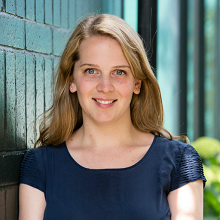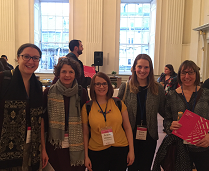
In November, I attended the National Coordinating Centre for Public Engagement (NCCPE) Engage Conference, held in Edinburgh. The aim of the conference is to provide an opportunity for all those interested in public engagement in higher education to come together, to share best practice, discuss common challenges, and of course… to network! This was my first time attending the conference, and I have to say I have come away from it inspired. With this blog I want to share my conference highlights.
Inspiring talks and best practice
Day one of the conference kicked off with two plenary sessions with contributions from leading practitioners of engagement. The speakers included: Rajesh Tandon, co-UNESCO Chair for Community-based Research and Social Responsibility in Higher Education; Ruth Gill and Xerxes Mazda from the National Museum of Scotland; Professor Dame Nancy Rothwell, President of the University of Manchester; Jennifer Wallace from Carnegie UK Trust. The speakers discussed the role of universities within in society, in particular showcasing examples of innovative engagement programmes within their different organisations. I was particularly impressed by the commitment and support that the University of Manchester have devoted to public engagement. Engaging with communities, and specifically public engagement, is featured as one of the key elements of the university’s Social Responsibility strategic goal.
I heard more about the University of Manchester’s public engagement activities during the plenary workshop ‘Stories of change’. Suzanne Spicer, Social Responsibility Manager, recounted the culture change process around public engagement the university went through over the past 10 years, which was exemplified by an image of a rollercoaster. It was a bumpy ride, but they learnt the importance of periodically stopping to reflect and acknowledge at which point of the rollercoaster you’re in. Most importantly, Suzanne emphasized that culture change around public engagement takes time.
I also attended a workshop led by Carla Ross and Becky Jones from Wellcome Trust on ‘An outcomes approach to public engagement’. Carla and Becky described the three new lead areas for Wellcome: Funding and Activities; Creative and Partnership; Research and Evidence. We then discussed a new draft framework for public engagement focusing on outcomes and measuring change.
Day one of the conference concluded with the Poster Party. This was a great opportunity to have a look at great examples of engagement activities and programmes from a wide variety of sectors, and of course to meet new people.

Evaluation, evaluation, evaluation
On the second day of the conference I attended two workshops on evaluating public engagement. Evaluation is an aspect of engagement I want to further develop at TREE, and these two workshops were extremely useful.
Firstly, Lesley Paterson and colleagues from the University of Oxford public engagement team explained their approach to evaluating Oxford’s European Researcher’s Night: Curiosity Carnival… without the use of questionnaires! The evaluation tools were creative and innovative, from a graffiti wall to a word competition. Lesley and her colleagues learnt that before starting to plan evaluation methods, you need decide on the outcome or impact of the public engagement activity you want to demonstrate; this will then guide which evaluation tools to use.
The second evaluation workshop I attended was led by Erin Hardee from the University of Dundee and Diane Kennedy from Evaluation Support Scotland. The duo explained the University’s collaboration with Evaluation Support Scotland to create their own evaluation strategy for public engagement; the process is outlined in detail in their publication ‘Our Evaluation Story’. To begin planning an evaluation strategy, the publication advises you need to answer two key questions: who are you working with, and what are you trying to achieve. The answers to these two important questions will help figure out what evaluation methods and tools are most appropriate. A huge variety of evaluation tools exist, and their publication outlines tools best suited for the type of information you’re trying to collect, including questionnaires, observation, interviews or external endorsement. I personally had a lightbulb moment when reflecting on who we are working with. I’d always thought about evaluating the impact of public engagement on the public, researchers, and the research itself. However, I quickly realised I was missing out on one key partner to evaluate… our MAGPIEs! Going forward, I will ensure I consider evaluating the impact of public engagement on MAGPIE members as well.
Overheard at Engage
“We can’t be institutions separate from society, we need to be institutions for and with society”
“The best test of your communication skills are 9 year olds”
“Make unusual friends, and be opportunistic”
“[in the context of evaluation] don’t let perfect be the enemy of good”
“Evaluation is about proving and improving”
“To show impact you need stories behind stats and stats behind stories”
Final thoughts
Participating in my first Engage conference was an inspiring and rewarding experience. I learnt about public engagement best practice, innovative collaborations, and shared challenges. I met many driven and inspiring public engagement professionals from all over the country I will keep in touch with.
Finally, I really enjoyed sharing the experience with four amazing colleagues from the University of Exeter: Grace Williams, Lindsey Anderson, Georgie Tarling and Jen Grove. We’ve agreed that we will continue to work collaboratively and share contacts internally, and even to work in partnership to develop an evaluation plan. I’m already looking forward to next year’s Engage!